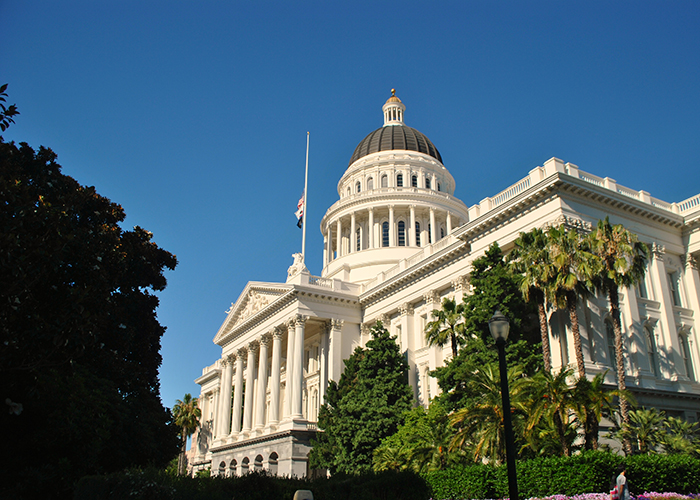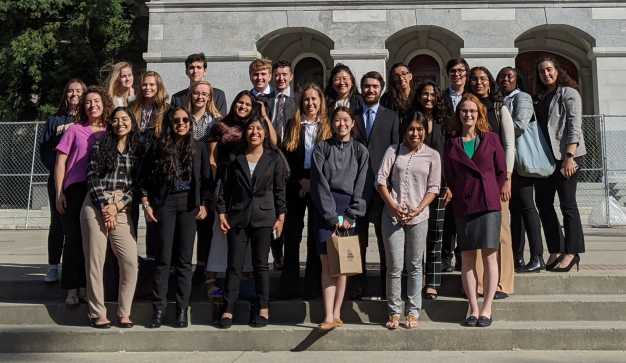Despite COVID-19, Cal-in-Sacramento internships thrived, remotely
Students examined data on COVID-19 relief efforts through a new partnership with the California Research Bureau
July 15, 2020

In the midst of a pandemic, this year’s crop of UC Berkeley Cal-in Sacramento fellows still contributed their time and skills to the state, but through remote internships. (Photo courtesy of flikr/Wayne Hsieh)
On March 13, the same day UC Berkeley announced it would continue spring semester online, due to the growing coronavirus pandemic, 33 students traveled by bus to Sacramento to interview for summer internships as part of the Cal-in-Sacramento Fellowship program at the Institute of Governmental Studies (IGS). During its more than three decades of existence, the program, part of the Robert T. Matsui Center for Politics and Public Service, has given more than 500 Berkeley students from a broad range of academic interests an opportunity to live together, in community, as they work in jobs throughout Sacramento.
That day, the students met with staff in senate and assembly offices, the governor’s office, CalEPA, the California Energy Commission, the Mexican American Legal Defense Educational Fund (MALDEF), the Little Hoover Commission and many other state agencies and nonprofits engaged in public service. Due to COVID-19 social norms, the interviewers and interviewees bumped elbows, rather than shaking hands and exchanging business cards.
Graduating senior Lyndsie Vale, a political science major who also participated in the program last year and is the student director for this year’s cohort, admitted the energy was different this time — students wondered if there would be any in-person internships, because of the pandemic — and called it “nervous excitement.”

UC Berkeley student interns from many academic disciplines visited the California Capitol this spring, then worked their Cal-in-Sacramento internships remotely this summer. In this photo, they’re standing in front of a Capitol building on March 13 before shelter-in-place policy was put in place. (Photo courtesy of Sonia Moctezuma)
In her case, the interview for her top choice internship was cancelled that morning. “This started making me really nervous, because I was concerned about what the job market would be like once the program was completed,” she said.
Pedro De Anda Plascencia, a rising senior from South Gate, California, found it hard to stay upbeat and optimistic during his interviews, as each one ended with a reminder that it might not happen. And while IGS Executive Director Christine Trost, who is also director of the Matsui Center, applauded the resilience and professionalism of the students, she, too, began having concerns.
“I was optimistic they would be able to begin their eight-week internships on May 26, as planned,” said Trost, “but as time went on, the bottom started to fall out. By the end of March, more than half of the internships had been cancelled.”
Once it became clear that more than half the students would be without in-person, or even remote, summer internships, Trost and Cal-in-Sacramento instructor David Ayón knew they needed a Plan B and began eyeing the California Research Bureau (CRB). Since 1991, the CRB has provided independent, nonpartisan, timely and confidential research and analysis for the governor, the Legislature and for other constitutional officers. Trost and Ayón developed and shared an ambitious proposal with the CRB that would not only give students a meaningful summer learning opportunity, albeit remote, but one that would allow them to contribute their skills and time to help the state respond to crises caused by the pandemic.
The CRB leadership and staff responded enthusiastically, fully embracing the proposed and innovative partnership. Tom Negrete, the CRB’s assistant director and a 1987 Berkeley alumnus who also interned with Cal-in-Sacramento, explained, “Once I started consulting with my staff about the idea of virtually hosting 18 interns, I kept hearing ideas and ways we might make it work. The deal was sealed for us once Christine made it clear she was prepared to help train the students with help from the D-Lab,” Berkeley’s Social Sciences Data Laboratory.
With CRB on board, Trost recruited trainers from the D-Lab and IGS Library staff to provide the students with additional support for their internships, which wrap up this week. “Everyone I reached out to immediately understood the value of the project and wanted to help provide our students with the tools and resources needed to succeed,” she said.
Students were divided into three research teams, each one led by CRB staff and with a specific focus. One is looking at how the pandemic has exacerbated existing inequalities in California and the differences among localities in their responses to the crisis. Another is studying the economic impact of the stay-at-home orders on households and industries at the district level. A third is developing estimates, by district, for COVID testing, cases, deaths, unemployment and labor force participation, and it plans to use these data to create interactive visualizations to make the data more accessible and easier to update.
Plascencia was one of the students whose original internship fell through. Instead of working at the Department of Insurance, he’s been researching the impact of COVID-19 on marginalized communities and their disproportionate access to local resources. In a subgroup of the Resources, Responses and Representation team, Plascencia has been doing a deep dive into six counties across the state and finding significant differences between county responses and resources. Vale is part of this team, as well, but her subgroup has focused on local response. She said she hopes her research will “show decision-makers inequities between counties and different groups of people.”
In addition to receiving training and mentorship, the students have had the rare opportunity to hear state legislative and agency staff members respond in real time to the health and economic crises caused by the pandemic. The CRB staff organized an impressive array of guest speakers for the interns and also arranged for them to meet with legislative staff and get feedback on their research products.
“We wanted to bring in speakers who could share what their office or agency was doing to fight COVID-19,” said Negrete, “and, at the same time, expose the students to some of the many research and policymaking roles that exist within state government. Everyone we reached out to, to speak with the 18 interns we were hosting, jumped at the chance — and several of the speakers ended up having follow-up chats with the interns to offer career advice.”
Vale has worked hard to give this summer’s group some of the magical experiences she had during her experience in Sacramento last summer. She’s been keeping all of the Cal-in-Sacramento interns socially connected through Zoom lunches and through a weekly check-in with the group of CRB research interns. “I try to keep these virtual meetings a mix of work topics and fun,” she said, “so we can all get to know each other better, network and learn more about each other’s internships.” The interns also have met remotely for after-hours group bonding events, like virtual games of Cards Against Humanity, Twenty Questions, Skribbl and Show and Tell, using objects from their homes.
As the internships wind down, Trost said she’s proud of all the program’s students, who “have adapted so quickly to the constraints and challenges caused by the pandemic.” None of them chose the option they were given to defer their internships to next summer, she added.
Hopefully, returning students will have an opportunity to do an in-person internship in the state’s capital next summer, and Trost and Negrete plan to meet at the end of this summer to discuss ways to continue Cal-in-Sacramento’s new partnership with CRB.